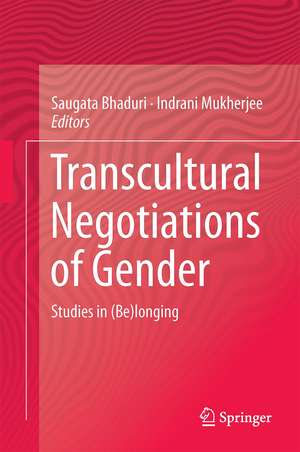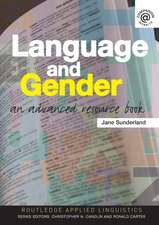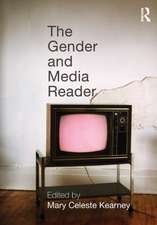Transcultural Negotiations of Gender: Studies in (Be)longing
Editat de Saugata Bhaduri, Indrani Mukherjeeen Limba Engleză Hardback – 29 sep 2015
The volume comprises four sections. Part I, ‘(Be)longing in Time’, examines negotiation of gender through transcultural acts of myths, rituals and religious practices being revised and revisited over time. Part II, ‘(Be)longing in Space’, studies how gender is renegotiated when people from different spaces interact, as also when public spaces and domains themselves become sites of such negotiations. In Part III, ‘Performing (Be)longing’, such transcultural negotiations are located in the context of changing modes of performance, considering particularly that gender itself is performative. The final section, ‘Modernity, Technology and (Be)longing’, traces how gender becomes transculturally negotiated in a space like India, with the advent of modernity and its companion technology.
| Toate formatele și edițiile | Preț | Express |
|---|---|---|
| Paperback (1) | 385.08 lei 6-8 săpt. | |
| Springer India – 23 aug 2016 | 385.08 lei 6-8 săpt. | |
| Hardback (1) | 396.40 lei 3-5 săpt. | |
| Springer India – 29 sep 2015 | 396.40 lei 3-5 săpt. |
Preț: 396.40 lei
Nou
Puncte Express: 595
Preț estimativ în valută:
75.88€ • 82.44$ • 63.78£
75.88€ • 82.44$ • 63.78£
Carte disponibilă
Livrare economică 01-15 aprilie
Preluare comenzi: 021 569.72.76
Specificații
ISBN-13: 9788132224365
ISBN-10: 8132224361
Pagini: 300
Ilustrații: XIX, 223 p.
Dimensiuni: 155 x 235 x 17 mm
Greutate: 0.61 kg
Ediția:1st ed. 2015
Editura: Springer India
Colecția Springer
Locul publicării:New Delhi, India
ISBN-10: 8132224361
Pagini: 300
Ilustrații: XIX, 223 p.
Dimensiuni: 155 x 235 x 17 mm
Greutate: 0.61 kg
Ediția:1st ed. 2015
Editura: Springer India
Colecția Springer
Locul publicării:New Delhi, India
Public țintă
ResearchCuprins
Part I: (BE)LONGING IN TIME.- Chapter 1: Curiosity Killed the... Woman: Modern Rewritings of “Bluebeard” in Literary Representations of Marital Abuse.- Chapter 2: New Feminine Myths as Builders of New Transcultural Horizons.- Chapter 3: Not by Faith Alone: Religion, Gender and the Public Domain in India.- Chapter 4: Subverting Brahminical Patriarchy through Myths and Folktales: Karnad’s Hidden Polemic.- Chapter 5: Religion and the Position of Women in Indian Society: De-masculinizing Mythologies and Religio-Sexual Rites.- Part II: (BE)LONGING IN SPACE.- Chapter 6: Through Other Eyes: Nineteenth-Century Irish Women in South America.- Chapter 7: “God knows five daughters is enough for anyone”: Gender Issues in India and Japan.- Chapter 8: Rewriting Genre/Gender: Crime Fiction by Women from India and Latin America.- Chapter 9: Gender Revolution in Socialist Cuba: Up to a Certain Point.- Chapter 10: Bodies of Pleasure: Rethinking Gender, Space and Identity.- Part III: PERFORMING (BE)LONGING.- Chapter 11: ‘Devadasi’ Reform in Colonial South India: The Case of Radhika Santwanam.- Chapter 12: Gender and Performance: The Case of Re-invention of Mohiniyattam in Early Twentieth Century Kerala.- Chapter 13: Wayward Women, Wicked Singing.- Chapter 14: Gendered Bhavas: Perpetuating Notions of ‘Ideal’ Male and Female Behaviour through Specific Emotions Highlighted in Acting in Mayabazar.- Chapter 15: The Relevance of Gender in the Narco Corrido/Narco Novel.- Part IV: MODERNITY, TECHNOLOGY AND (BE)LONGING.-
Chapter 16: Tagore’s Women Heralding the ‘New Indian Woman’: A Critique of the Women’s Question in the Nationalist Discourse.- Chapter 17: Manasi to Neera: the Evolution of the Concept of ‘Muse’ in Modern Bengali Poetry.- Chapter 18: “Gulabi Talkies”: Technology, Empowerment and Changing Spaces Women Occupy.- Chapter 19: ‘Because You’re Worth It’: The New Woman in Post Liberalisation Women’s Magazines in India.- Chapter 20: “Googling Baby”.
Chapter 16: Tagore’s Women Heralding the ‘New Indian Woman’: A Critique of the Women’s Question in the Nationalist Discourse.- Chapter 17: Manasi to Neera: the Evolution of the Concept of ‘Muse’ in Modern Bengali Poetry.- Chapter 18: “Gulabi Talkies”: Technology, Empowerment and Changing Spaces Women Occupy.- Chapter 19: ‘Because You’re Worth It’: The New Woman in Post Liberalisation Women’s Magazines in India.- Chapter 20: “Googling Baby”.
Notă biografică
Saugata Bhaduri is Professor at the Centre for English Studies, Jawaharlal Nehru University, New Delhi. He has taught, conducted research, and published extensively in the areas of literary and cultural theory, popular culture of both the folk and technologized sort, translation and comparative literature, and gender and sexuality. He has been visiting professor at different institutions in Europe and the Americas, and has been a recipient of grants for collaborative research from major international bodies like Leverhulme Trust, UK Arts Council, UKIERI, Erasmus Mundus, DAAD, BMBF, etc. The collaborative research projects he is currently engaged in are “Performing Gender: Negotiating Space in Civil Society” (in partnership with the University of Würzburg, Germany), “Polycoloniality in India: Cultural Transactions with Europe from Early Modernity to the 19th Century” (in partnership with the University of Göttingen, Germany), and “Computer Gaming across Cultures” (in partnership with Bangor University, UK, and West Virginia University, USA).
Indrani Mukherjee is Professor at the Centre of Spanish, Portuguese, Italian and Latin American Studies, Jawaharlal Nehru University, New Delhi. She is a second generation Hispanist who wrote the first ever PhD on Latin American Literature from any Spanish department in India. Her academic career spans across 30 years and her publications are in the areas of comparative literature, cultural studies and pedagogy of literature. She is working on two research projects on comparative gender studies from India and Latin America which are funded by the University Grants Commission, India, and the UPE, Jawaharlal Nehru University, India. She has been invited by many universities and academic forums in India and abroad to give lectures (including keynote, plenary or other), chair sessions of conferences or even speak as an Indian representative in India-Spain-Latin America
World forums. She is a life member of the European Network for Comparative Literary Studies and of the Forum on Contemporary Theory, Baroda (India), which is in academic collaboration with the International Lincoln Center at the Louisiana State University, Shreveport, USA and University of North Texas at Denton, USA.
Indrani Mukherjee is Professor at the Centre of Spanish, Portuguese, Italian and Latin American Studies, Jawaharlal Nehru University, New Delhi. She is a second generation Hispanist who wrote the first ever PhD on Latin American Literature from any Spanish department in India. Her academic career spans across 30 years and her publications are in the areas of comparative literature, cultural studies and pedagogy of literature. She is working on two research projects on comparative gender studies from India and Latin America which are funded by the University Grants Commission, India, and the UPE, Jawaharlal Nehru University, India. She has been invited by many universities and academic forums in India and abroad to give lectures (including keynote, plenary or other), chair sessions of conferences or even speak as an Indian representative in India-Spain-Latin America
World forums. She is a life member of the European Network for Comparative Literary Studies and of the Forum on Contemporary Theory, Baroda (India), which is in academic collaboration with the International Lincoln Center at the Louisiana State University, Shreveport, USA and University of North Texas at Denton, USA.
Textul de pe ultima copertă
Transcultural Negotiations of Gender probes into how gender is negotiated along the two axes of ‘belonging’ and ‘longing’– the twin desires of being located within a cultural milieu, while yearning for either what has passed by or what is yet to come. It also probes into the category of ‘transculturality’ itself, by examining how not only does it pertain to the coming together of cultures from diverse spatial locations, but how shifts over time and changing performative modes and technological means of articulation, within what may be presumed to be the same culture, can also lead to the ‘transcultural’.
The volume comprises four sections. Part I, ‘(Be)longing in Time’, examines negotiation of gender through transcultural acts of myths, rituals and religious practices being revised and revisited over time. Part II, ‘(Be)longing in Space’, studies how gender is renegotiated when people from different spaces interact, as also when public spaces and domains themselves become sites of such negotiations. In Part III, ‘Performing (Be)longing’, such transcultural negotiations are located in the context of changing modes of performance, considering particularly that gender itself is performative. The final section, ‘Modernity, Technology and (Be)longing’, traces how gender becomes transculturally negotiated in a space like India, with the advent of modernity and its companion technology.
The volume comprises four sections. Part I, ‘(Be)longing in Time’, examines negotiation of gender through transcultural acts of myths, rituals and religious practices being revised and revisited over time. Part II, ‘(Be)longing in Space’, studies how gender is renegotiated when people from different spaces interact, as also when public spaces and domains themselves become sites of such negotiations. In Part III, ‘Performing (Be)longing’, such transcultural negotiations are located in the context of changing modes of performance, considering particularly that gender itself is performative. The final section, ‘Modernity, Technology and (Be)longing’, traces how gender becomes transculturally negotiated in a space like India, with the advent of modernity and its companion technology.
Caracteristici
Studies the interface between gender and culture from both global and local perspectives Contributors – themselves from diverse countries like Brazil, India, Ireland, Scotland, Serbia, and the USA – provide perspectives covering an even more diverse spectrum also involving Japan, Mauritius, and various countries of Europe and Latin America, and from diverse disciplines of the humanities and social sciences Provides a unique intervention in terms of the novelty of its theoretical premises Includes supplementary material: sn.pub/extras















